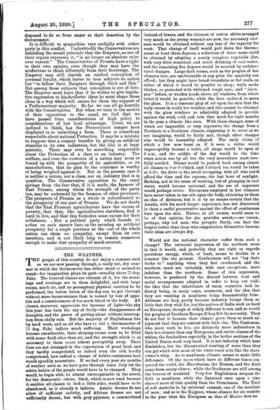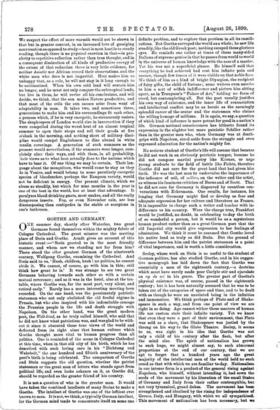THE WEATHER.
THE people of this country do not enjoy a summer such as we are now passing through, a really hot, dry sum- mer in which the thermometer has either stood or seemed to stand—for imagination plays its part—steadily above 75 deg. Fahr. The leisured classes are tolerant of it, for the morn- ings and evenings are to them delightful, and with large rooms, much air, and no peremptory physical exertion to be performed, the hotter hours of the day can be got through without more inconvenience than is caused by loss of appe- tite and a consciousness of too much blood in the body. All classes, moreover, appreciate the increase of light—the sky this year has been the sky of Sicily—the disappearance of draughts, and the power of getting about without interrup- tion from chilly rain. But the majority of Englishmen live by hard work, and on all who have to toil a thermometer of 75 deg. Fahr. inflicts much suffering. Their workshops become unendurable, their sleeping-rooms seem to be filled with some fluid other than air, and the strength which is so necessary to ,them oozes almost perceptibly away. Their lives are not arranged in the expectation of great heat, and they hardly comprehend, as indeed even the rich hardly comprehend, how radical a change of habits continuous heat would speedily necessitate. If we had every year six months of weather such as we have gone through since July 1st the entire habits of the people would have to be changed. They would, to begin with, be almost unrecognisable in the street, for the democratic colour, black, which is now used because it enables all classes to look a little alike, would have to be abandoned, as it already is indoors. Asiatic dresses do not allow of sufficient activity, and African dresses are not sufficiently decent, but with grey pyjamas, a cummerbund instead of braces, and the thinnest of cotton shirts arranged very much as the young women's are now, the necessary cool- ness would be obtained without any loss of the capacity for work. That change of itself would pull down the thermo- meter at least three degrees, a reduction of three more could be obtained by adopting a nearly complete vegetable diet, with very little stimulant and much drinking of cool water, and the remaining five degrees would be secured by architec- tural changes. Large dark rooms, such as the peoples of hot climates love, are unobtainable at any price the majority can afford ; but they might have broad verandahs or flat roofs, on either of which it would be possible to sleep ; walls made thicker, or protected with whitened rough cast ; and " jalou- sies " before, or wooden hoods above, all windows, from which latter it would be possible, while the heat endured, to move the glass. It is a constant play of air upon the skin that the body craves in really hot weather, and this cannot be obtained with the glass windows so admirably adapted to provide against the wind, cold, and rain that mark for eight months in the year a climate like ours. With those changes, none of which are impossible or very expensive, the change from a Northern to a Southern climate, supposing it to occur as we are imagining, would be fairly met, though other changes also would be insensibly adopted. The early rising of which a few now boast as if it were a virtue would imperceptibly become a habit, all shops would be open at 6 a.m., and the middle of the day would be the time when action was by all but the very necessitous most care- fully avoided. Dinner would be pushed back among almost all classes to S or 9 o'clock, and 5 o'clock tea would be taken at 6.30; the drive or the stroll occupying, with all who could afford the time and the expense, the last hour of sunlight. Bathing, not in the sense of washing, but of plunging in cool water, would become universal, and the use of unguents would perhaps revive. Europeans employed in hot climates have never taken to use oils upon the body, attaching to them an idea of dirtiness, but it is by no means certain that the Asiatic, with his much longer experience, has not discovered in them a useful preservative against the effect of continuous heat upon the skin. Nature, at all events, would seem to be of that opinion, for she provides sweat,—one reason, perhaps, why red men, who perspire freely, can face the tropics better than those who congratulate themselves because their skins are always dry.
Would not the national character suffer from such a change? The universal impression of the northern races is that it would, and probably they are right as regards persistent energy, which, at least, seems to decline in a summer like the present. Northerners will not "lay their backs to " anything when they feel overheated, and the southern races are certainly, with rare exceptions, more indolent than the northern. Some of this impression, however, is produced by the discord between heat and social arrangements adopted in order to keep out cold the idea that the inhabitants of warm countries lack in- dustry being, in many cases, erroneous, and the idea that they are wanting in manliness being demonstrably false. Africans are lazy, partly because industry brings them so little that they wish for, but the natives of India work as bard as Europeans, though at widely different hours, and so would the peoples of Southern Europe if they felt thenecessity. They do not feel it because their climate gives them so much en- joyment that they are content with little else. The Cantonese, who must work to live, are distinctly more industrious in their hot climate than any Europeans, and entire classes of the whites, the freeholders especially, in the hotter sections of the United States work very hard. It is not industry which heat diminishes, but the discontented wanting of more than they can get which with most of the white races acts like the slave owner's whip. As to manliness, climate seems to make little difference. Of the races which have at different times con- quered the world, the Macedonian, the Roman, and the Arab came from sunny climes ; while the Soudanese are still among the bravest of mankind. Very few Englishmen surpass the Sikh in manliness, while the Spaniard once upon a time showed more of that quality than the Frenchman. The Turk of soft Anatolia is, by universal consent, one of the manliest of men ; and so is the Rajpoot, whose climate for six months in the year tries the European as that of Mexico does no
We suspect the effect of more warmth would not be shown in that but in greater content, in an increased love of gossiping conversation as opposed to study—heat is most hostile to steady reading, though there is no physical exertion in that—in pro- clivity to repetitive reflection rather than true thought, and in a consequent diminution of all kinds of productive energy of the extent of that reduction there is very little evidence, for neither Asiatic nor African record their observations, and the white man who does is not impartial. Heat makes him so unhappy that, as a rule, he will not stay in it long enough to be acclimatised. When his own cold land will sustain him no longer, and he must not only conquer the subtropical lands, but live in them, he will revise all his conclusions, and will decide, we think, that the sun makes Nature productive, and that most of the evils the sun causes arise from want of adaptability in man. It takes two, and sometimes three, generations to make him and his surroundings fit each other, a process which, if he is very energetic, he strenuously resists. The shopkeepers of London would rise in insurrection if they were compelled during the worst heat of an almost tropical summer to open their shops and sell their goods at five o'clock in the morning, and nothing short of military disci- pline would compel Englishmen to dine abroad in white muslin coverings. A generation of such summers as the present would nevertheless, if the summers were longer, com- pletely alter their ways, and with them, in all probability, :heir views as to what heat actually does to the nations which have to bear it. Of one thing we may be certain. Their lan- guage about the mosquitoes, who would come to stay as they lo in Venice, and would belong to some peculiarly energetic species of bloodsucker, perhaps the Rangoon variety, would not be deficient in energy. Our present climate, which we abuse so steadily, but which for nine months in the year is one of the best in the world, has at least that advantage. It paralyses blood-drinking gnats, most snakes, and all the really dangerous insects. Fog, or even November rain, are less discomposing than centipedes in the stable or scorpions in one's bathroom.



































 Previous page
Previous page